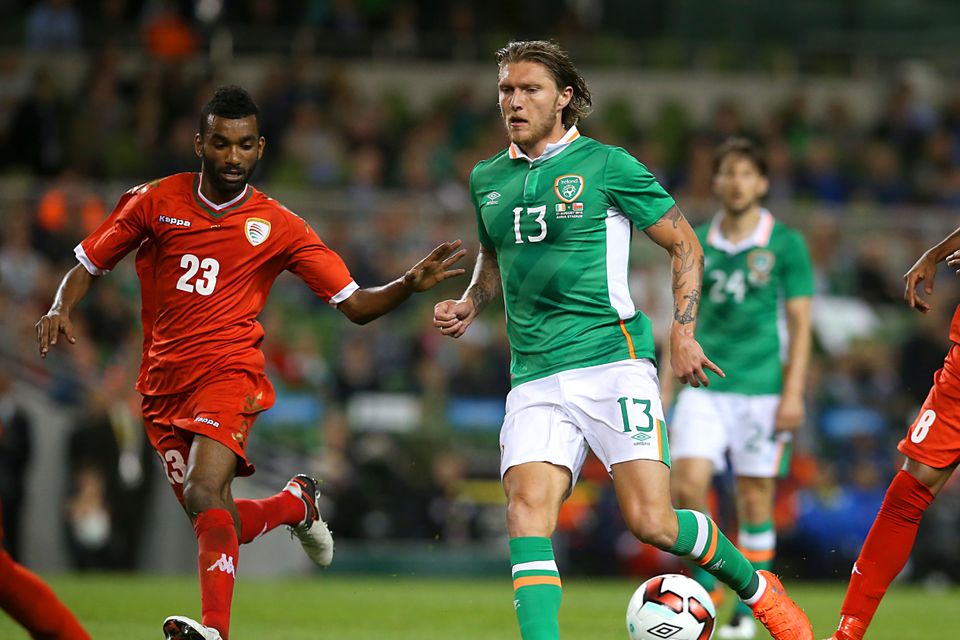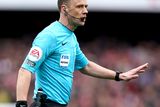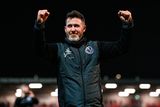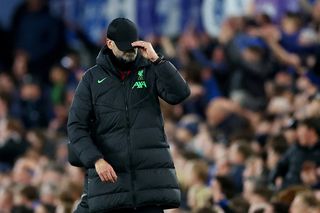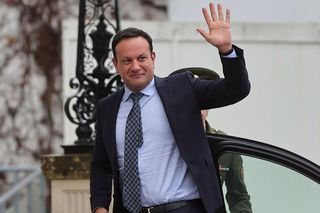Stephen Hunt: Having no players at top clubs shouldn't hurt Ireland
The quality of overseas talent in England still gives great opportunity to learn from the best
'Jeff Hendrick was one of our best performers at Euro 2016 and part of a new generation, and has just got his first Premier League move to Burnley, a club likely to be in a relegation battle.' Photo: PA
I remember just before we travelled to Bulgaria with Ireland in 2009 under Giovanni Trapattoni, John O'Shea had joined up with the squad after playing in big Champions League match against Barcelona, and everyone was asking him about it.
'What was Leo Messi like, John?' 'What was Andres Iniesta like?' 'What do you remember about that moment?' 'What did you think of them?' You could hear the questions around the room.
In that sense, I suppose we were asking about the things that many supporters would, but it also reflects something about the squad right now. Sheasy isn't at Manchester United any more, and we don't have anyone in the Champions League right now to ask those questions of; to get that higher-level knowledge.
After Martin O'Neill named his latest squad on Friday, today and tomorrow almost sum it up. Shane Long is arguably our best player and is turning out this afternoon for Southampton, a club who would consider it a great season to finish sixth.
Jeff Hendrick was one of our best performers at Euro 2016 and part of a new generation, and has just got his first Premier League move to Burnley, a club likely to be in a relegation battle.
It's an issue that comes up any time there's a transfer involving one of our main players, or even after a defeat: how much does the level the squad are generally playing at actually matter? It goes without saying that it's obviously beneficial to have more players in the Champions League, but what is the effect of that in real terms?
I actually don't think it's as damaging as is often made out but, to say why, it's probably worth laying out the positives first.
You could feel the love for O'Shea, or Damien Duff or Robbie Keane, when they came into the Irish set-up on the back of big games for big clubs. You could also feel they had a level of power over us, and it did bring a presence - and calmness - to their game on the pitch. That calmness was particularly the case with O'Shea. No matter the game, he would always do the same things, and you would sense a certain respect for players like that from the opposition too.
Off the pitch, they'd get all those questions, as well as about players at their clubs. Sheasy was obviously asked about Cristiano Ronaldo all the time, or Ryan Giggs; Duffers about Jose Mourinho. There are connections in every team and, as a player, you're always fishing for that information.
"Does he train hard? What's he really like? What did he do with that injury?"
"He's fit." "He actually does nothing." Players you never think of are often the best trainers. They give you that information you can learn from. They can also give you information on the international opposition that they know.
Remember in Euro 2016 when Luka Modric advised the Croatian goalkeeper on facing a Sergio Ramos penalty. The conversation when they met up again at Real Madrid would have been interesting.
Once you're part of a team, though, everything else is out the window. You will do what is necessary to win. You also pick up information to use yourself, to help how things are done, and that is a simple way that players at top clubs raise the standards.
I had been studying how United played for years, for example, so I used to ask Sheasy all sorts of questions about the level required to play there.
But this is the thing, too. Much is often made of the level the Euro '88 team played at, or the Italia '90 team, but you have to remember it was a different era.
I'm not knocking the quality of the players, and we clearly don't have the really big stars anymore, but the English top flight then just wasn't the international event it is now. There wasn't anywhere near the same competition for places at clubs. Would as many Irish players from that time have made it at those top-four clubs in the same circumstances? I'm not sure.
It used to be the case that there would be at most one or two players from abroad in a team, but now there are only one or two Irish or British players, and they often have a duty to keep alive a certain club culture and a high-tempo way of playing.
In those days, it was more like the old Five Nations, and I'd say players used to love joining up with Ireland because international football was undeniably the higher level. Now, you're up against some of the best in the world in the Premier League every week. Playing against Sergio Aguero, or going up against a Pep Guardiola-coached side, is an educational experience you would have only got on rare occasions in the past.
And that is one reason why I don't think it's that much of an issue. The Premier League brings so much now in terms of competitiveness and standards in general.
Every player in it will bring something different to the Irish set-up, be it the way they train; how they rest; ice baths; hot baths; what certain clubs do in terms of the mental side. I learned something different from an Irish team-mate every time I went away with the squad.
One thing that has been common to the Irish squad is clusters of players at certain clubs. I've been at two of them, at Reading and Hull City, and there are now four players at Stoke City, even if two are no longer involved with the national team.
Those clusters help, even beyond the understanding it immediately grants between players on a pitch. When they arrive, they arrive together, and it brings an atmosphere. From my perspective, Kevin Doyle was my Reading team-mate but got called up before I did. That was positive for me, too, because, one, it inspired me to get there. Two, once I got there, I had someone to have the banter with. It's a way of introducing you to the group. Long was obviously at Reading too, and I think Kevin had a big role in mentoring Shane. He learned how to handle games from him.
There's another side of all this too, one that is enhanced by how odd and idiosyncratic international football can be. Players at a lower level can create a hunger, and a spirit. Look at Northern Ireland.
Ireland could even benefit in that way from Hendrick's move to Burnley. He'll now be playing against better players, and will raise his game. He'll be sharper, quicker and always ready to go in the mind.
So, just because we can't ask our own players about the Champions League any more, doesn't mean we can't still ask questions of the opposition's stars on the pitch.
